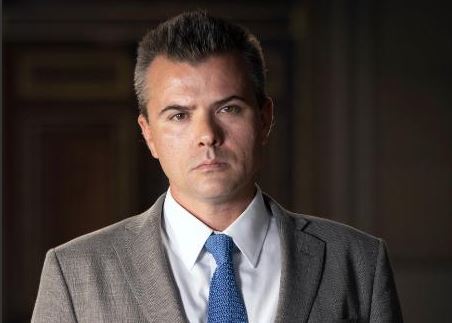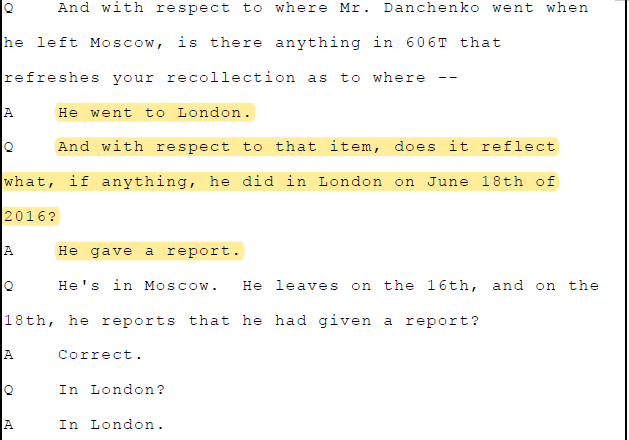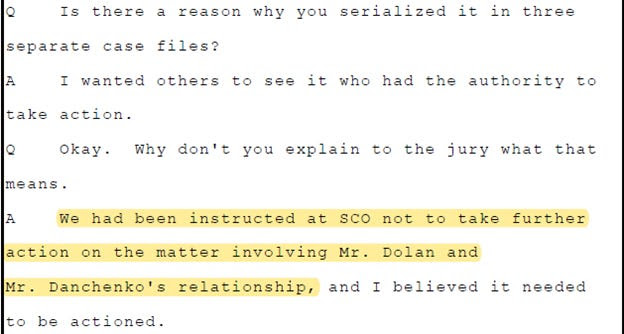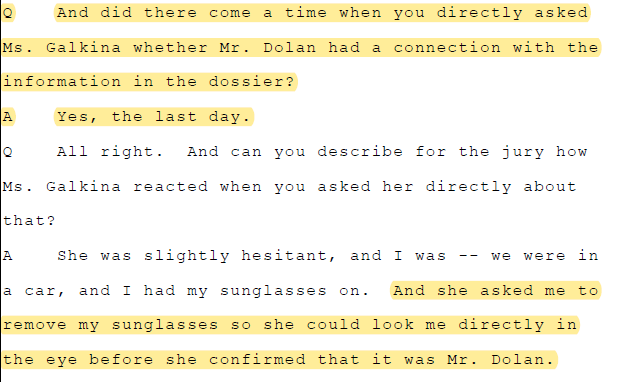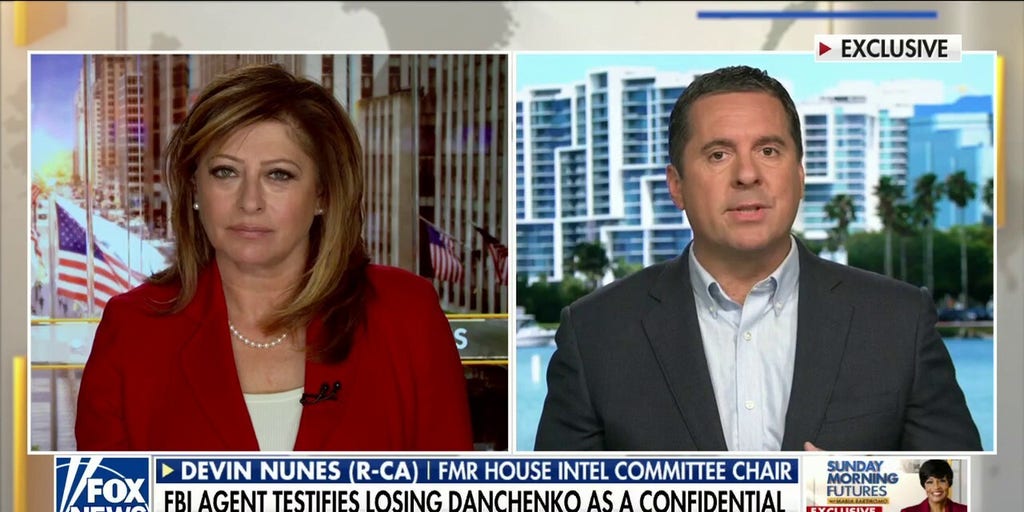Techno Fog
Day 3 of the Igor Danchenko false statements trial started with the testimony of Democrat activist and Clinton ally Charles Dolan. For background, Dolan has historic ties to the Democrat party, was a state chairman of Bill Clinton’s 1992 and 1996 presidential campaigns, and was an advisor to Hillary Clinton’s 2008 presidential campaign.
And he was also a source for the Steele dossier.
Dolan’s connections to Russia began from his consulting work, where he served to attract foreign investments into Russia in the 2000s. As part of that job, he would have regular conference calls with the spokesman for Russian President Vladimir Putin and had occasional meetings with other Russian officials. Other work, such as assisting Disney in obtaining a broadcast license, would keep him connected to Russia.
Dolan was introduced to Igor Danchenko through Fiona Hill in the spring of 2016. I’ll let Dolan explain:
That friend Danchenko was trying to assist was a woman by the name Olga Galkina. Dolan would eventually meet with her in Cyprus in March of 2016. Galkina would eventually become relevant to the Dossier story.
Danchenko and Dolan kept in touch, meeting from time to time. Part of the reason they stayed connected was because of the “potential opportunities” Dolan’s firm (kgobal) and Danchenko’s employer, Orbis, might pursue. (The business opportunities never presented themselves.)
In May 2016, Dolan reached out to Danchenko because he would be traveling to Moscow to attend a conference at The Ritz-Carlton. Dolan eventually traveled to Moscow in June 2016. At that time, Danchenko was already in Moscow and the two met in that city. Dolan returned to the US and he and Danchenko remained in occasional contact.
All this background information was necessary to help establish the Dolan-Danchenko relationship. From there, Special Counsel Michael Keilty produced an e-mail where Danchenko reached-out about the Trump campaign:
Dolan responded to Danchenko, stating: “Let me dig around on Manafort. Pretty sure the new team wanted him gone ASAP and used today's New York Times story to drive a stake in his heart.”
He followed-up with another e-mail to Danchenko, where he said:
The Reactionary is a reader-supported publication. To receive new posts and support my work, consider becoming a free or paid subscriber.
Danchenko would again request information from Dolan, saying “It's an important project for me, and our goals clearly coincide.” Dolan figured Danchenko said this because “he knew I would be a supporter of the Clinton campaign.”
Special Counsel Keilty then showed Dolan parts of the Steele Dossier and compared them to the information Dolan provided Danchenko. He asked Dolan if the information he provided Danchenko was “substantially similar” to what was in the Steele Dossier. Dolan’s response: “Yes.”
Fast forward to January 2017. Buzzfeed released the Steele Dossier and a client of Dolan’s was mentioned in the document. Dolan had a suspicion about Orbis and Danchenko’s involvement, so he reached out. Danchenko hedged on the matter and then disappeared, never getting back to Dolan:
Cross-Examination of Dolan
I’ll be brief on this part. Dolan conceded that at the time he first saw the Steele Dossier, he didn’t recognize the information he provided Danchenko. Instead, Dolan recalled he may have realized he was a source of the Dossier information during an interview with the Special Counsel in September 2021. Then there was this key exchange:
That exchange we cited above seems to contradict Dolans’s statement during direct examination that the information he gave Danchenko was “substantially similar” to the Dossier allegations. Keilty cleaned it up with this exchange:
The Testimony of FBI Special Agent Kevin Helson (Washington Field Office)
Agent Helson was Danchenko’s handler once he became a confidential human source (CHS) in March 2017. He wasn’t a part of Crossfire Hurricane. But he was approached by members of the Crossfire Hurricane team – Steve Somma and Brian Auten – to help manage their new source.
Helson had been managing Danchenko by the time Mueller was appointed Special Counsel. Here’s how the interactions went:
Interestingly, Danchenko appeared to have been given favorable treatment – even for a paid CHS. Helson said it’s typically standard practice that the monetary compensation is “based on the type of information” the source gives. Danchenko, however, was paid thousands just to sit down and talk to the FBI.
Helson would eventually take part in interviews with Danchenko that were recorded without Danchenko’s knowledge. Some of the questions were presented from Auten, such as Auten’s instructions to “Readdress the Sergei Millian matter. We have discrepancies.”
The Millian matter would be readdressed – with Helson first admitting he didn’t know Millian had a formal relationship with the FBI until trial prep. In fact, Helson was kept in the dark by Auten and Somma, not seeing any correspondence between Danchenko and Millian (and not seeing correspondence between Dolan and Danchenko). Helson stated he was “very confident” Danchenko told him he spoke with Millian a couple times.
From there, a good deal of questions related to the Crossfire Hurricane/Mueller Team not providing Helson with Danchenko’s communications:
Cross-Examination of Helson
Briefly, here are some highlights of the cross-examination of Helson by Danchenko’s attorneys:
To close, we’ll provide key excerpts of the conclusion of Helson’s testimony. Our friend Fool Nelson was in attendance and said Durham lit Helson up. Understandably so, as Helson defended and criticized the closure of Danchenko as a CHS.
Specifically, Durham caught Helson in a falsehood about the paperwork used to open Danchenko as a CHS:
Durham also brought up the issue of Danchenko committing fraud in connection with his immigration. As you can see, Helson tried to explain-away the mistakes.
Durham also brought up Helson’s failure to check Danchenko’s statements against his past travel records, and how Helson didn’t follow recommendations to assess Danchenko’s “actual motives”:
With that in mind, today ended with this question/answer:
It looks like Danchenko will not testify. Not a surprise. We might see closings on Monday. Probably followed by a verdict that same day, if not by Tuesday. We’ll see.
This is the second day in a row that Durham has basically treated the FBI Agents/Analysts as hostile witnesses. First it was Auten, now it was Helson. It’s just not about the incompetence and their basic investigative failures.
It’s also that these FBI Agents and Analysts come across as arrogant, at least from my reading of the transcripts, and continue to hold themselves essentially blameless. All the while, they have at times defended Igor Danchenko, the witness who didn’t tell them the truth. It’s not a good look for the Bureau.
| Oct 14 |
Day 3 of the Igor Danchenko false statements trial started with the testimony of Democrat activist and Clinton ally Charles Dolan. For background, Dolan has historic ties to the Democrat party, was a state chairman of Bill Clinton’s 1992 and 1996 presidential campaigns, and was an advisor to Hillary Clinton’s 2008 presidential campaign.
And he was also a source for the Steele dossier.
Dolan’s connections to Russia began from his consulting work, where he served to attract foreign investments into Russia in the 2000s. As part of that job, he would have regular conference calls with the spokesman for Russian President Vladimir Putin and had occasional meetings with other Russian officials. Other work, such as assisting Disney in obtaining a broadcast license, would keep him connected to Russia.
Dolan was introduced to Igor Danchenko through Fiona Hill in the spring of 2016. I’ll let Dolan explain:
That friend Danchenko was trying to assist was a woman by the name Olga Galkina. Dolan would eventually meet with her in Cyprus in March of 2016. Galkina would eventually become relevant to the Dossier story.
Danchenko and Dolan kept in touch, meeting from time to time. Part of the reason they stayed connected was because of the “potential opportunities” Dolan’s firm (kgobal) and Danchenko’s employer, Orbis, might pursue. (The business opportunities never presented themselves.)
In May 2016, Dolan reached out to Danchenko because he would be traveling to Moscow to attend a conference at The Ritz-Carlton. Dolan eventually traveled to Moscow in June 2016. At that time, Danchenko was already in Moscow and the two met in that city. Dolan returned to the US and he and Danchenko remained in occasional contact.
All this background information was necessary to help establish the Dolan-Danchenko relationship. From there, Special Counsel Michael Keilty produced an e-mail where Danchenko reached-out about the Trump campaign:
Dolan responded to Danchenko, stating: “Let me dig around on Manafort. Pretty sure the new team wanted him gone ASAP and used today's New York Times story to drive a stake in his heart.”
He followed-up with another e-mail to Danchenko, where he said:
This information turned out to be false. Dolan admitted upon questioning from Keilty that he never had a drink with a “GOP friend.” He got the information from cable news."I had drink with a GOP friend of mine who knows some of the players and got some of what is in this article, which provides even more detail. She also told me that Corey Lewandowski, who hates Manafort and still speaks to Trump regularly played a role. He is said to be doing a happy dance over it. "I think the bottom line is that in addition to Ukraine revelations, a number of people wanted Manafort gone. It is a very sharp elbows crowd."
The Reactionary is a reader-supported publication. To receive new posts and support my work, consider becoming a free or paid subscriber.
Danchenko would again request information from Dolan, saying “It's an important project for me, and our goals clearly coincide.” Dolan figured Danchenko said this because “he knew I would be a supporter of the Clinton campaign.”
Special Counsel Keilty then showed Dolan parts of the Steele Dossier and compared them to the information Dolan provided Danchenko. He asked Dolan if the information he provided Danchenko was “substantially similar” to what was in the Steele Dossier. Dolan’s response: “Yes.”
Fast forward to January 2017. Buzzfeed released the Steele Dossier and a client of Dolan’s was mentioned in the document. Dolan had a suspicion about Orbis and Danchenko’s involvement, so he reached out. Danchenko hedged on the matter and then disappeared, never getting back to Dolan:
Cross-Examination of Dolan
I’ll be brief on this part. Dolan conceded that at the time he first saw the Steele Dossier, he didn’t recognize the information he provided Danchenko. Instead, Dolan recalled he may have realized he was a source of the Dossier information during an interview with the Special Counsel in September 2021. Then there was this key exchange:
Re-direct of DolanQ And I think you have already testified to this, but even knowing everything that the government has done to look into you, it's still your testimony today that you've never talked to Mr. Danchenko about anything that ended up in the dossier, correct?
A Correct.
That exchange we cited above seems to contradict Dolans’s statement during direct examination that the information he gave Danchenko was “substantially similar” to the Dossier allegations. Keilty cleaned it up with this exchange:
The Testimony of FBI Special Agent Kevin Helson (Washington Field Office)
Agent Helson was Danchenko’s handler once he became a confidential human source (CHS) in March 2017. He wasn’t a part of Crossfire Hurricane. But he was approached by members of the Crossfire Hurricane team – Steve Somma and Brian Auten – to help manage their new source.
The Danchenko CHS task was assigned to Agent Helson by his Washington Field Office supervisor. Helson was to “meet with and eventually open Mr. Danchenko as a CHS, to get him to report on stuff that was of interest to us.” His interest in Danchenko was primarily “Russian counterintelligence,” as opposed to Auten and Somma’s interest in the Dossier.“I was approached most likely -- I think it was around the end of January 2017 -- by two members of the Crossfire Hurricane team who had identified an individual that they had just conducted a three-day interview. It was in the course of that three-day interview they had learned that there was potential for more information relative to the programs that I was working.”
Helson had been managing Danchenko by the time Mueller was appointed Special Counsel. Here’s how the interactions went:
Helson was asked about whether Danchenko was able to corroborate any of the Dossier allegations:“The general understanding that I had with Crossfire Hurricane and ultimately what became the Mueller Investigation was if you want questions asked related to the dossier, I will ask them, but it's going to be incumbent upon them to give those to me.”
Interestingly, Danchenko appeared to have been given favorable treatment – even for a paid CHS. Helson said it’s typically standard practice that the monetary compensation is “based on the type of information” the source gives. Danchenko, however, was paid thousands just to sit down and talk to the FBI.
Helson would eventually take part in interviews with Danchenko that were recorded without Danchenko’s knowledge. Some of the questions were presented from Auten, such as Auten’s instructions to “Readdress the Sergei Millian matter. We have discrepancies.”
The Millian matter would be readdressed – with Helson first admitting he didn’t know Millian had a formal relationship with the FBI until trial prep. In fact, Helson was kept in the dark by Auten and Somma, not seeing any correspondence between Danchenko and Millian (and not seeing correspondence between Dolan and Danchenko). Helson stated he was “very confident” Danchenko told him he spoke with Millian a couple times.
From there, a good deal of questions related to the Crossfire Hurricane/Mueller Team not providing Helson with Danchenko’s communications:
There was also a long series of questions and answers on Dolan, the interviews, and Olga Galkina. Then Durham asked Helson about the Dossier being used in the Carter Page FISA warrant, and Helson’s 2017 conclusion that it was bunk:Q. With respect to this email [from Dolan to Danchenko], would that be something that you would have been interested in on June 15th of 2017?
A. Yes.
Q. But you didn't have -- did you have it or not?
A. No.
Q. Did you ever get that other than recently?
A. No.
…
Q. Do you know, sir -- or at the time, did you know whether or not there was any information that then appeared in any of the dossier reports relating in some way to these emails?
A. Not until you showed me.
Q. And who is it that is saying in there (As read): "Right, because it's not others, no legally -- there's no attorney that's ever going to put that on as evidence anyway."?
A. Yeah, that was me.
Q. But do you know, sir, now, whether or not the uncorroborated information concerning a well coordinated conspiracy of cooperation portion out of 95, was that used in a legal document?
A. I understand that it -- I think it was used or cited in a FISA application.
Q. And that was against an American citizen, correct?
A. I believe that was -- yes.
Q. And it was completely unvetted?
A. Yes.
Cross-Examination of Helson
Briefly, here are some highlights of the cross-examination of Helson by Danchenko’s attorneys:
- Helson came to trust Danchenko. Their relationship lasted from March 2017 through October 2020.
- Early on, Danchenko demanded more money from the FBI, purportedly because he was “at risk.”
- The Crossfire Hurricane/Mueller Team “never raised any real concerns” about the information Danchenko provided.
- The Crossfire Hurricane team never asked Helson to image Danchenko’s cell phone or obtain his e-mails.
- Helson told Danchenko, as a CHS, that “he should scrub his phone” to mask “his connection to Steele and any connection” to the FBI.
- Helson sought approval to pay Danchenko $10,900 at one point. Another request was for $10,000.
- Helson was “upset” that Danchenko’s January 2017 was released to the public.
- After Danchenko was ended as a source, Helson requested Danchenko receive a lump sum payment of $346,000. This would have brought the total payments to Danchenko to $565,000. The $346,000 payment was not approved. (Overall, Danchenko was paid over $200,000….)
To close, we’ll provide key excerpts of the conclusion of Helson’s testimony. Our friend Fool Nelson was in attendance and said Durham lit Helson up. Understandably so, as Helson defended and criticized the closure of Danchenko as a CHS.
Specifically, Durham caught Helson in a falsehood about the paperwork used to open Danchenko as a CHS:
Durham raked Helson over the coals on this issue, pointing out that Helson never corrected his falsehood after learning of this derogatory information”Q. Let me ask you again, with respect to the opening of Mr. Danchenko as a confidential human source, you filled out paperwork, correct?
A. Correct.
Q. And in that paperwork, one of the important questions is: Is there any derogatory information about this person, correct?
A. Correct.
Q. And you wrote, there is no derogatory information?
A. Yeah, based on my search.
Q. And that is untrue?
A. It was there was a case on him.
Q. And what was the -- what was the nature of the case?
A. It was a counterintelligence investigation out of a different field office.
Q. It's a 65-day file, correct?
A. Correct.
Q. Is that counterintelligence?
A. Yes.
Q. Of a particular type?
A. Yes, an espionage case. An espionage case.
Durham also brought up the issue of Danchenko committing fraud in connection with his immigration. As you can see, Helson tried to explain-away the mistakes.
A. No.Q. Yeah. In fact, it's to determine whether or not there was fraud committed in connection with his immigration, correct?
A. Correct.
Q. Did you do that?
A. No. He went -- he had went to –
Q. Well, that's not my question.
A. Okay.
Q. Did you do that?
A. No, no.
Q. To your knowledge, did anybody that's working on Crossfire Hurricane, Mr. Mueller's group or otherwise, ever run that to ground and do what had been recommended?
Durham also brought up Helson’s failure to check Danchenko’s statements against his past travel records, and how Helson didn’t follow recommendations to assess Danchenko’s “actual motives”:
Helson’s failures kept on being pointed out:Q. All right. Well, what about looking at what he had said as compared to what the records showed? Did you do that going backward?
A. Not going backwards, no.
Q. Did they make a specific recommendation to you that the Bureau behavioral assessment group conduct an examination to determine what Mr. Danchenko's actual motives, allegiances and vulnerabilities were?
A. Yes.
Q. And did you do that?
A. No.
Then Durham asked Helson about the Washington Field Office recommendation to polygraph Danchenko, apparently concerned with Danchenko’s loyalties:Q. Were you -- was it recommended that you do an assessment or to look at the financial nature of Mr. Danchenko's employment because of the concern that he may be prone to shopping around his information in search of work and pre-composing reporting containing unsolicited material, which may indicate the FBI is not the primary audience for his information?
A. Yeah, I saw that in the report.
Q. Did you do that?
A. No.
Q. Was it recommended that the Washington Field Office determine whether Mr. Danchenko committed any unauthorized illegal activity for the apparent falsehoods and inaccuracies contained in his visa and immigration documents?
A. Yes, they recommended that.
Q. Did you do that?
A. No.
There was one final point of contention between Durham and Helson which will spill over into tomorrow morning. Helson had disagreed with the recommendation to look further into Danchenko’s ties to Russian intelligence. This recommendation came from an analyst who spent 19 years as an army counterintelligence officer in Europe.Q. Did they specifically recommend to the Washington Field Office and you that you considered administering a polygraph of Mr. Danchenko to determine if he has ever been tasked by a foreign individual, entity or government to collect information or to perform actions adverse to the U.S. interest?
A. They recommended that, yes.
Q. Did you do that?
A. No.
With that in mind, today ended with this question/answer:
Other matters…Q. Do you recall, sir, whether or not you or any of your colleagues who were looking at the dossier and trying to corroborate the information there, did you or anybody to your knowledge in the FBI attempt to run to ground and complete or conclude, resolve that case that had to be closed because the FBI mistakenly thought he had left the country? Anybody do anything to resolve that?
A. No.
It looks like Danchenko will not testify. Not a surprise. We might see closings on Monday. Probably followed by a verdict that same day, if not by Tuesday. We’ll see.
This is the second day in a row that Durham has basically treated the FBI Agents/Analysts as hostile witnesses. First it was Auten, now it was Helson. It’s just not about the incompetence and their basic investigative failures.
It’s also that these FBI Agents and Analysts come across as arrogant, at least from my reading of the transcripts, and continue to hold themselves essentially blameless. All the while, they have at times defended Igor Danchenko, the witness who didn’t tell them the truth. It’s not a good look for the Bureau.






